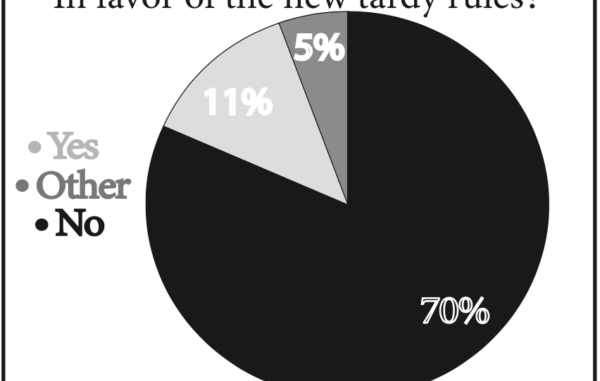
writing: Aryan Bommena
design: Sophie Rogers
Doors Locked – 8:15 to 2:35. For all of my four years of high school, this sheet of paper was a mainstay during my morning walks into school. Until it suddenly disappeared, without warning.
Students entering school following President’s Day on Feb. 21 were met with a surprise—an orange tardy slip. Suddenly, the doors started locking at 8:10 a.m. Although, second period starts at 8:10, most teachers have used the five minutes spent watching the student news as a grace period.
Just one week later, students with a first period class were met with another surprise when the second set of doors started locking at 7:20 sharp. Forcing any student, regardless of whether they were just a couple of minutes late, to enter through the attendance office and collect a pass.
In both situations, administrators did not communicate with students, almost as if they wanted a reason to give more tardies rather than wanting students to show up on time.
The draconian tardy policy at the high school is extremely excessive and does substantially more harm than good. Students are able to receive three tardies before their first detention from the attendance office, regardless of if they were only a couple of minutes late, every subsequent tardy is an admin-enforced detention. The school’s administration has made it clear, through the energy and time they spend, that they value students being punished more than they value these same students actually attending class and learning.
For example, first period students can choose to just skip their class and come in on time during second period. This saves them a detention with the obvious downside being that they miss a day of class—but for many that’s a fair trade-off.
In previous years, students were incentivized to be on time through the use of orange and blue cards given out by the attendance office. These were get-out-of-jail-free-cards regarding a tardy or an unexcused absence offered to students who maintained perfect attendance records each quarter.
It’s important to have a policy in place to ensure students attend school on time, but this policy does not need to be so strict. Most students don’t have any malicious intent to miss or skip school—they are simply busy.
Forced to juggle full schedules, sports practices, jobs, and homework. It is extremely difficult for students to get a full night’s rest and have the energy to show up to school on time.
Not to mention the horrendous traffic situation every morning on East Orange Road and Walker Wood Boulevard. Are students who live less than a mile from the school expected to leave their homes 45 minutes before school starts?
Rather than punishing students on the number of times they’re late, administration should instead tally up their total minutes. For example, a student who is only a couple of minutes late twice a week should not be punished as harshly as a student who consistently misses 15 minutes of class. An even better solution would be to leave it up to the student’s teacher. These teachers know their students substantially better than school administration and will have an easier time communicating their classroom policies.
The orange and blue card system should also return, it should be possible to reward the students who are on time daily while also empathizing with the students who are running late. I also urge the school administration to work with students to set a clear and effective approach and to clearly communicate with the student body before any sudden change to the attendance policy.


